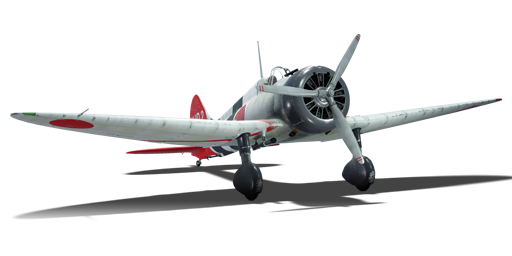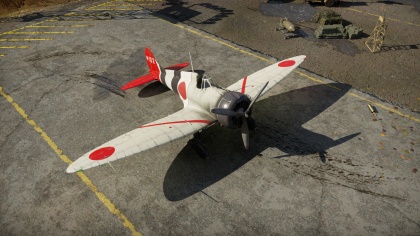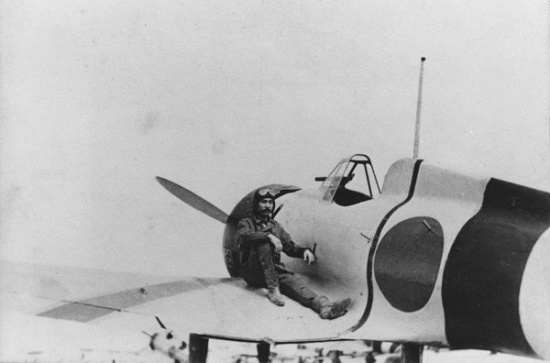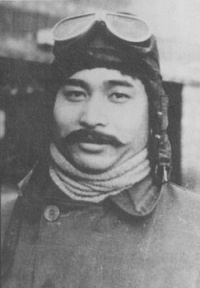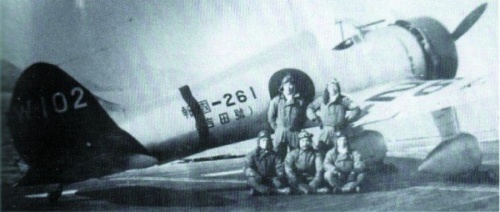Difference between revisions of "Hagiri's A5M4"
(→General info) (Tag: Visual edit) |
m (→Details: Arrestor hook) |
||
| Line 79: | Line 79: | ||
! Arrestor gear | ! Arrestor gear | ||
|- | |- | ||
| − | | ✓ || ✓ || ✓ || X || | + | | ✓ || ✓ || ✓ || X || ✓ <!-- ✓ --> |
|- | |- | ||
|} | |} | ||
Revision as of 19:39, 18 August 2020
Contents
| This page is about the premium Japanese fighter Hagiri's A5M4. For other uses, see A5M4. |
Description
The Hagiri's A5M4 is a rank I premium Japanese fighter
with a battle rating of 1.3 (AB/RB/SB). This aircraft was introduced in Update 1.31. The plane is painted after the camouflage scheme of Japanese pilot Matsuo Hagiri, who used the A5M4 during his time in the fighter squadron on the Sōryū aircraft carrier.
The Allied reporting name for this aircraft was "Claude".
General info
Flight Performance
| Characteristics | |||||||
|---|---|---|---|---|---|---|---|
| Stock | |||||||
| Max Speed
(km/h at 2,900 m) |
Max altitude
(meters) |
Turn time
(seconds) |
Rate of climb
(meters/second) |
Take-off run
(meters) | |||
| AB | RB | AB | RB | AB | RB | ||
| 431 | 421 | 9 800 | 12.5 | 13.4 | 10 | 10 | 325 |
| Upgraded | |||||||
| Max Speed
(km/h at 2,900 m) |
Max altitude
(meters) |
Turn time
(seconds) |
Rate of climb
(meters/second) |
Take-off run
(meters) | |||
| AB | RB | AB | RB | AB | RB | ||
| 463 | 447 | 9 800 | 12.1 | 12.3 | 16.7 | 12.8 | 325 |
Details
| Features | ||||
|---|---|---|---|---|
| Combat flap | Take-off flap | Landing flap | Air brakes | Arrestor gear |
| ✓ | ✓ | ✓ | X | ✓ |
| Limits | ||||
|---|---|---|---|---|
| Wing-break speed (km/h) |
Gear limit (km/h) |
Combat flap (km/h) |
Max Static G | |
| + | - | |||
| 0 | 558 | 420 | ~12 | ~4 |
| Optimal velocities | |||
|---|---|---|---|
| Ailerons
(km/h) |
Rudder
(km/h) |
Elevators
(km/h) |
Radiator
(km/h) |
| < 280 | < 320 | < 360 | > 324 |
| Compressor (RB/SB) | ||
|---|---|---|
| Setting 1 | ||
| Optimal altitude | 100% Engine power | WEP Engine power |
| 2,000 m | 680 hp | 788 hp |
Engine performance
| Engine | |||||
|---|---|---|---|---|---|
| Engine Name | Number present | ||||
| Nakajima Kotobuki 41 9-cylinder | 1 | ||||
| Engine characteristics | |||||
| Weight (each) | Type | Cooling | |||
| 350 kg | Radial | Air | |||
| Engine power (Stock) | |||||
| Mode | Max | Take-off | |||
| Arcade | 557 hp | 656 hp | |||
| Realistic/Simulator | 551 hp | 650 hp | |||
| Engine power (Upgraded) | |||||
| Mode | Max | Take-off | |||
| Arcade | 700 hp | 799 hp | |||
| Realistic/Simulator | 619 hp | 718 hp | |||
| WEP Duration | |||
|---|---|---|---|
| Arcade | Realistic/Simulator | ||
| 25 seconds | Infinite | ||
Survivability and armour
- No armour
- Non-self-sealing fuel tanks (2 in each wing)
- Oil cooling systems located in prone position (in each inner top part of the wing)
- Open cockpit
Armaments
Offensive armament
Hagiri's A5M4 is armed with:
- 2 x 7.7 mm Type 89 machine guns (500 rpg=1000 total)
Usage in battles
The Hagiri's A5M4 is to be used in a fighter role, staying low and using the extremely quick turn times to get on the tail on the enemy is essential. Keep an eye on ammo levels and well as your surroundings, this is an extremely weak aircraft in terms of armour. It is relatively fast in a straight line, but not as quick as much of the opposition it will be facing in the game. It is recommended to use speed against biplanes as their turn times are nearly matched if not better than this monoplane.
Realistic battles
The A5M4 can accelerate to 350 km/h in just less than a minutes time from takeoff. Will climb up to 2,500 m in around one minute and fifty seconds time when climbing in a 20-degree angle. Dive speeds are decent as the A5M4 will exceed 550 km/h in an 80-degree angle from just 2,500 m height. Be careful though, once the A5M4 reaches 560 km/h, the plane will violently shake about and if the throttle isn't cut, the plane wings may rip off. Though speed can be gained in the dive, energy is not easily retained, taking only a minute or so to fall to back to the maximum speed of 380 km/h with WEP or 360 km/h without.
Decent horsepower with the typical Japanese light aircraft would give the idea that the plane would be great in the vertical axis dog fighting. With a problem with keeping constant fuel flow as the plane changes the angle on its vertical axis means it is better to stick with horizontal dog fighting which isn't a bad thing as it will outturn most all contemporary aircraft.
Simulator mode procedures
Hands-off carrier take-off (Auto engine control): Ignite engine, flaps: raised, elevator trim: 6% up, aileron trim: 0%, rudder trim: 21% right, WEP throttle, hands off controls until the plane lifts off the carrier.
Manual Engine Control
| MEC elements | ||||||
|---|---|---|---|---|---|---|
| Mixer | Pitch | Radiator | Supercharger | Turbocharger | ||
| Oil | Water | Type | ||||
| Controllable | Not controllable | Not controllable | Not controllable | Separate | Not controllable | Not controllable |
Modules
| Tier | Flight performance | Survivability | Weaponry | ||
|---|---|---|---|---|---|
| I | Fuselage repair | Radiator | Offensive 7 mm | ||
| II | Compressor | Airframe | New 7 mm MGs | ||
| III | Wings repair | Engine | |||
| IV | Engine injection | Cover | |||
| This is a premium vehicle: all modifications are unlocked on purchase | |||||
Pros and cons
Pros:
- Great turn time
- Good visibility (in cockpit view)
- Low stall speed
- Fixed landing gear makes landings easier
- Has combat, takeoff and landing flaps
Cons:
- Terrible survivability (open cockpit, no armour, and fuel tanks are not self-sealing)
- Fixed landing gear creates more drag
- Poor gun cooling; easily jams
- Suffers from fuel starvation problems (RB/SB)
History
Describe the history of the creation and combat usage of the aircraft in more detail than in the introduction. If the historical reference turns out to be too big, take it to a separate article, taking a link to the article about the vehicle and adding a block "/ History" (example: https://wiki.warthunder.com/(Vehicle-name)/History) and add a link to it here using the main template. Be sure to reference text and sources by using <ref>, as well as adding them at the end of the article. This section may also include the vehicle's devblog entry (if applicable) and the ingame encyclopedia description (under === Encyclopedia Info ===, also if applicable).
Encyclopedia Info
An all-metal single-seat fighter with an open cockpit and unretractable landing gear, it was the first carrier-based monoplane fighter in the world. Its prototype got off the ground for the first time on February 4, 1935.
This aircraft, with the tail number W-102, was part of the fighter squadron based on the aircraft carrier Souryu, of the Imperial Japanese Navy.
It was piloted by Matsuo Hagiri, a Japanese ace and test pilot who shot down 13 enemy planes. Hagiri was among the first sortie of Zeroes that accompanied the bombers during the Chongqing air raid.
Featured pilot
Media
See also
Links to the articles on the War Thunder Wiki that you think will be useful for the reader, for example:
- reference to the series of the aircraft;
- links to approximate analogues of other nations and research trees.
External links
Paste links to sources and external resources, such as:
- topic on the official game forum;
- encyclopedia page on the aircraft;
- other literature.
| Mitsubishi Company (三菱商会) | |
|---|---|
| Fighters | A5M4 · Hagiri's A5M4 |
| A6M2 mod. 11 · A6M2 · A6M3 · A6M3 mod. 22 · A6M3 mod. 22Ko · A6M5 · A6M5 Ko · A6M5 otsu · A6M5 Hei · A6M6c | |
| A7M1 (NK9H) · A7M2 | |
| J2M2 · J2M3 · J2M4 Kai · J2M5 · J2M5 (30 mm) | |
| Hydroplanes | F1M2 |
| Interceptors | Ki-83 · Ki-109 |
| Bombers | G4M1 |
| Ki-21-Ia · Ki-21-I hei · Ki-67-I Ko · Ki-67-I otsu | |
| Jet Fighters | Ki-200 |
| Captured | ▃A6M2 · ␗A6M2 |
| See also | Mitsubishi Heavy Industries, Ltd. (Post-War) |
| Japan fighters | |
|---|---|
| Navy | |
| Carrier-based fighter | |
| A5M | A5M4 · Hagiri's A5M4 |
| A6M | A6M2 mod. 11 · A6M2 · A6M3 · A6M3 mod. 22 · A6M3 mod. 22Ko · A6M5 · A6M5 Ko · A6M5 otsu · A6M5 Hei · A6M6c |
| A7He | A7He1* |
| A7M | A7M1 (NK9H) · A7M2 |
| Land-based Fighter | |
| J2M | J2M2 · J2M3 · J2M4 Kai · J2M5 · J2M5 (30 mm) |
| J6K | J6K1 |
| J7W | J7W1 |
| N1K-J | N1K1-Ja · N1K2-J · N1K2-Ja |
| Fighter seaplane | |
| N1K | N1K1 |
| A6M-N | A6M2-N |
| Army | |
| Ki-10 | Ki-10-I · Ki-10-I C · Ki-10-II · Ki-10-II C |
| Ki-27 | Ki-27 otsu · Ki-27 otsu Tachiarai |
| Ki-43 | Ki-43-I · Ki-43-II · Ki-43-III otsu |
| Ki-44 | Ki-44-I · Ki-44-I 34 · Ki-44-II otsu · Ki-44-II hei |
| Ki-61 | Ki-61-I ko · Ki-61-I otsu · Ki-61-I hei · Tada's Ki-61-I hei · Ki-61-I tei · Ki-61-II Otsu Kai |
| Ki-84 | Ki-84 ko · Ki-84 otsu · Ki-84 hei |
| Ki-87 | Ki-87 |
| Ki-94 | Ki-94-II |
| Ki-100 | Ki-100 · Ki-100-II |
| Other countries | ▅F4U-1A · ▅P-51C-11-NT · ▅Bf 109 E-7 · ▅Fw 190 A-5 |
| *Imported designation of the He 112 (A6M was in development - A7M would take A7 designation after the cancelation of the A7He) | |
| Japan premium aircraft | |
|---|---|
| Fighters | Hagiri's A5M4 · A7He1 · Ki-27 otsu Tachiarai |
| Ki-44-II otsu · ▅Bf 109 E-7 · ▅F4U-1A · Ki-100-II · Ki-44-I 34 | |
| ▅Fw 190 A-5 · A7M1 (NK9H) · Tada's Ki-61-I hei · ▅P-51C-11-NT | |
| J2M4 Kai · A6M5 Ko · A6M6c · J2M5 · Ki-87 · J6K1 | |
| Twin-engine fighters | Ki-96 |
| Jet fighters | F-86F-40 JASDF▅ · T-2 Early · F-4EJ ADTW |
| Strike aircraft | ▄AV-8S |
| Bombers | Ki-21-I hei · Ki-48-II otsu · H8K3 · B7A2 (Homare 23) · ▅B-17E |


